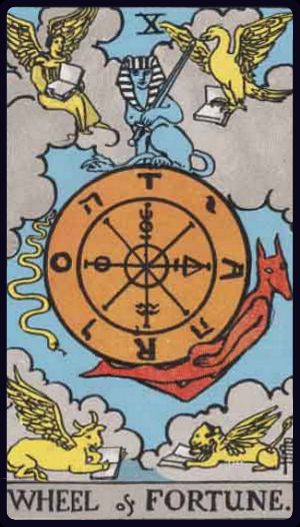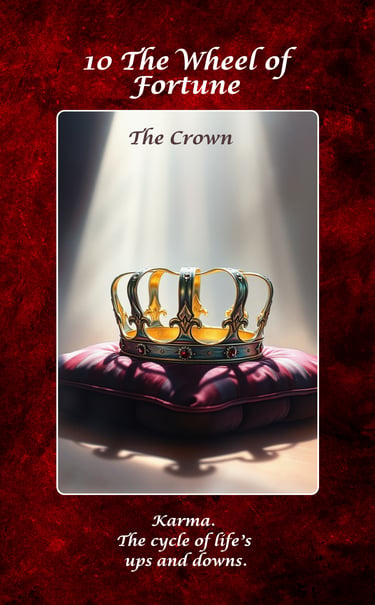10 The Wheel of Fortune
In the traditional deck...


The Wheel of Fortune represents the cycles of fate, destiny, and the inevitable changes that govern human experience. This card symbolizes the constant motion of life—what goes up must come down, and what falls will eventually rise again. The wheel represents forces beyond our direct control, karmic cycles, and the understanding that both good fortune and hardship are temporary states. The Wheel of Fortune reminds us that change is the only constant, and that accepting life's natural rhythms with grace and wisdom is essential for navigating both triumph and adversity. This card often appears during major life transitions, when circumstances are shifting dramatically, or when you need to remember that current difficulties (or successes) are part of a larger cycle that will continue to turn.
In the Shakespeare deck...


The crown on its velvet cushion perfectly captures the Wheel of Fortune's message through Shakespeare's recurring theme of power's transient nature. Across his plays—from the rise and fall of kings in the histories to Macbeth's bloody ascent and destruction, from Lear's abdication to Richard III's brief reign—the crown symbolizes how fortune elevates and destroys with equal measure. The crown is won through ambition, inherited by birthright, lost through betrayal, fought over in civil wars, and sometimes willingly relinquished. It represents the ultimate symbol of worldly power, yet Shakespeare consistently shows how precarious that power truly is. The empty crown on its cushion reminds us that all earthly positions are temporary, and that the wheel of fortune spares no one—not peasant, not king.
Interpretation...
When the Wheel of Fortune appears, major changes are occurring or approaching in your life. This card suggests that circumstances beyond your direct control are shifting the foundations of your current situation, whether for better or worse. Like the crown that passes from hand to hand throughout Shakespeare's plays, your current position—whether high or low—is not permanent. The Wheel reminds you to accept these changes as part of life's natural rhythm rather than fighting against forces larger than yourself. If you're experiencing difficulties, remember that the wheel will turn and bring better times. If you're riding high, use this period wisely and remain humble, knowing that fortune is cyclical and circumstances will inevitably shift again.
Advice...
Accept that change is inevitable and often beyond your direct control
Remember that both good fortune and hardship are temporary states
Use periods of success to prepare for future challenges
Stay humble during times of triumph and hopeful during difficulties
Look for the larger patterns and cycles at work in your life
Adapt gracefully to changing circumstances rather than resisting them
Trust that the wheel will turn and bring new opportunities in time